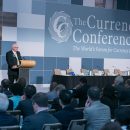virtual currency – second life and the linden dollar debate
29 April, 2009
We all live in a world where hard currency is a basic necessity, notwithstanding the attempts by many alternate payment forms to displace it’s pervasive use. What I find truly fascinating however is the growing on-line use of virtual money. I am sure that most of you are familiar with PayPal as one of the most pre-eminent forms of virtual payment. What I am surprised at is the unfamiliarity with the concept of the virtual on-line world known as Second Life. Not everyone is unfamiliar with it as there are some 7.5 million “residents”. However in my peer network at least it is not well known at all.
 Founded in 2003, Second Life is an on-line virtual society formed around a world called Linden. To the uninitiated it would appear to be a game and to others a colossal waste of time (I must admit to being in the latter group). What puzzles me as a “currency worker” is the real economy that has grown out of Second Life. This “free” interactive site has spawned multiple millionaires – casino operators, real estate brokers, naturalization assistants, clothing manufacturers and purveyors of other less savory activities. There seem to be as many ways to make money in Linden as there are in the real world – with the exception of counterfeiting.
Founded in 2003, Second Life is an on-line virtual society formed around a world called Linden. To the uninitiated it would appear to be a game and to others a colossal waste of time (I must admit to being in the latter group). What puzzles me as a “currency worker” is the real economy that has grown out of Second Life. This “free” interactive site has spawned multiple millionaires – casino operators, real estate brokers, naturalization assistants, clothing manufacturers and purveyors of other less savory activities. There seem to be as many ways to make money in Linden as there are in the real world – with the exception of counterfeiting.
The truly amazing part of this “virtual social concept” is the rapidly expanding network of web-based businesses that cater to the exchange of Linden Dollars for hard US currency. Fluctuations of exchange rates follow the curve of supply and demand and may actually be creating a virtual need for regulation. Linden has a monetary policy and a currency exchange. Linden also has the support of the corporate world with support from the likes of IBM, Michelin and Xerox. Linden also has no end of critics who suggest that Second Life is nothing less than a virtual ponzi scheme (is Bernie Madoff involved with this?) or at the very least a High Yield Investment Program (HYIP). In fact there are a number of on-going and pending lawsuits that are destined to resolve these debates.
For those of us who are passionate (or at least professionally curious) about the future of hard currency, Second Life and Linden Dollars in particular are worthy of our attention. As I suggested in an earlier post, this may well be the model for a truly global currency.









